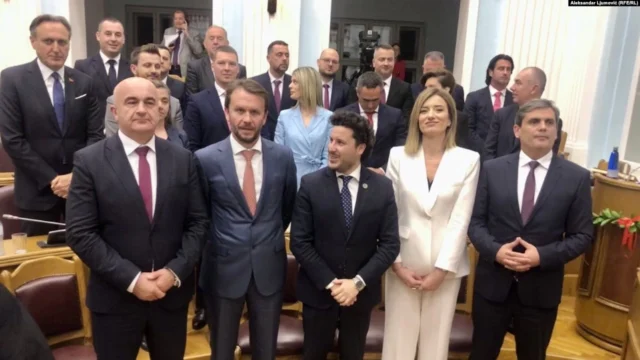Montenegro’s parliament has approved a new minority government led by Prime Minister Dritan Abazovic, who said a main goal of the new government is to unblock the process of European integration.
The election of the government ends the three-month mandate of the pro-Serbian and pro-Russian government of Prime Minister Zdravko Krivokapic, which was defeated in a no-confidence motion on February 4.
The new government, which is composed of moderate parties that are both pro-European and pro-Serbian, secured the votes of 45 deputies out of a total of 81 in the Montenegrin parliament.
Abazovic’s cabinet was supported by his own Civic Movement URA and its other constituents: the pro-Serbian Socialist People’s Party (SNP), the Social Democratic Party (SDP), and the national parties of Albanians, Bosniaks, and Croats.
It also was backed by the Democratic Party of Socialists (DPS), the party of President Milo Djukanovic, but the DPS has no representatives in the new government.
Deputies from the pro-Serbian Democratic Front and the Democrats, who strongly oppose the DPS-backed minority government, did not attend the session. The two parties accuse Abazovic of betraying the electoral will of the citizens and demand new elections.
Abazovic, 36, who served as deputy prime minister in the previous government, said the new government “will rest on two main pillars, the rule of law and economic development.” Above all, he said, “Montenegro needs political and social stability.”
Montenegro, a NATO member that began accession negotiations with the EU in 2012, is deeply divided between pro-EU parties and conservative pro-Serbian and pro-Russian parties with links to the Serbian Orthodox Church.
Abazovic, whose URA was a member of the former ruling coalition, was among critics of the former government over its sluggish handling of the COVID-19 pandemic, poor record in attracting investment, and a slowdown in European integration.
Presenting the government’s program, Abazovic said that it would be based on the rule of law and economic development, while sustainable investments, EU integration, environmental protection, and the fight against corruption are key areas of action.
Reforms are required so that Montenegro can ask for its accession into the EU to be sped up, especially in the light of the situation created by the war in Ukraine.
“Russia’s aggression against Ukraine, which the previous government has already condemned and pledged to respect EU sanctions on Russia, has caused turbulent geopolitical developments,” Abazovic said.
“Despite these challenges and the generation of new crises, new prospects have been opened up for Montenegro for accession to the European Union.”
The reshuffle comes less than two years after Montenegrins voted out the DPS, which wielded power in the tiny Balkan country for three decades. (Radio Free Europe)
